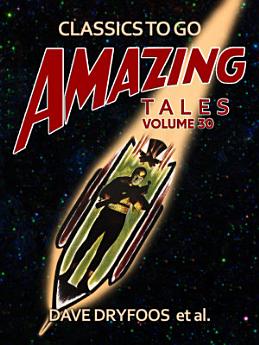Amazing Tales Volume 30
Dave Dryfoos et al.
Jan 2025 · CLASSICS TO GO Book 30 · Otbebookpublishing
Ebook
85
Pages
family_home
Eligible
info
reportRatings and reviews aren’t verified Learn More
About this ebook
Embark on a journey beyond the stars with "Amazing Tales Volume 30", an extraordinary anthology that offers an unparalleled expedition through the boundless cosmos of human imagination, where each story is a portal to discovery and wonder. Witness the indomitable courage of humanity in "Sign Of Life", as characters struggle for survival against the perilous death-winds of Venus. Traverse the enigmatic terrains of a distant world alongside Naomi Heckscher in "Tree, Spare that Woodman", where each step is a test of will and discovery. Dave Dryfoos's own "Waste Not, Want" captivates with a heart-wrenching narrative of resistance, showcasing an elderly hero's battle against the relentless tide of consumerism in a society obsessed with the new and disposable. Each tale breathes new life into the perennial themes of love, loss, and resilience. "Uniform of a Man" invites you into a gripping saga of vengeance, while "New Hire" offers a satirical peek into the prolonged adolescence of tomorrow's workforce. Experience the electrifying convergence of past and future in the dystopian landscape of "Bridge Crossing", and cheer for the empowerment of individuality in "Journey Work", set against the backdrop of a raw and edgy near-future California. Finally, let "Seller of the Sky" sweep you away on a whimsical, speculative adventure narrated by a mysterious wanderer who unfurls the tapestry of forgotten histories. Each story in "Amazing Tales Volume 30" is a masterful narrative that explores survival, identity, and transformation, promising a captivating journey for enthusiasts of science fiction, cosmic horror, and speculative fiction. Lose yourself in this vivid kaleidoscope of adventure, mystery, and the timeless pursuit of human connection. Dive deep and uncover the universe—not just as it is, but as it could be.
About the author
Dave Dryfoos, an enigmatic figure in mid-20th century American literature, carved a niche for himself in the realm of speculative fiction. Born in 1915, Dryfoos's early life was marked by the turbulence of the Great Depression, which profoundly influenced his themes of survival, resilience, and the human spirit's capacity for innovation. His works often explored futuristic societies, technological advancements, and the ethical dilemmas they posed, making him a pioneer in the genre.Dryfoos's literary contributions extend beyond mere storytelling; he was a visionary who foresaw the impact of technology on human relationships and societal structures. His narratives were imbued with a sense of urgency and a call for introspection, urging readers to consider the moral ramifications of their actions in an increasingly mechanized world. This foresight earned him a dedicated following and cemented his place among the pantheon of speculative fiction writers.Controversy was never far from Dryfoos, as his bold ideas often clashed with the conservative norms of his time. His advocacy for social justice, environmental conservation, and technological ethics resonated with the countercultural movements of the 1960s and 70s, aligning him with contemporaries like Isaac Asimov and Philip K. Dick. Dryfoos's influence on these writers is evident in their shared exploration of dystopian futures and the human condition.Despite his relatively modest bibliography, Dryfoos's impact on the genre is undeniable. His revolutionary ideas and willingness to challenge societal norms continue to inspire modern writers, ensuring that his legacy endures. For readers seeking a blend of imaginative storytelling and profound philosophical inquiry, Dave Dryfoos remains a timeless figure in speculative fiction.
Rate this ebook
Tell us what you think.
Reading information
Smartphones and tablets
Install the Google Play Books app for Android and iPad/iPhone. It syncs automatically with your account and allows you to read online or offline wherever you are.
Laptops and computers
You can listen to audiobooks purchased on Google Play using your computer's web browser.
eReaders and other devices
To read on e-ink devices like Kobo eReaders, you'll need to download a file and transfer it to your device. Follow the detailed Help Center instructions to transfer the files to supported eReaders.







